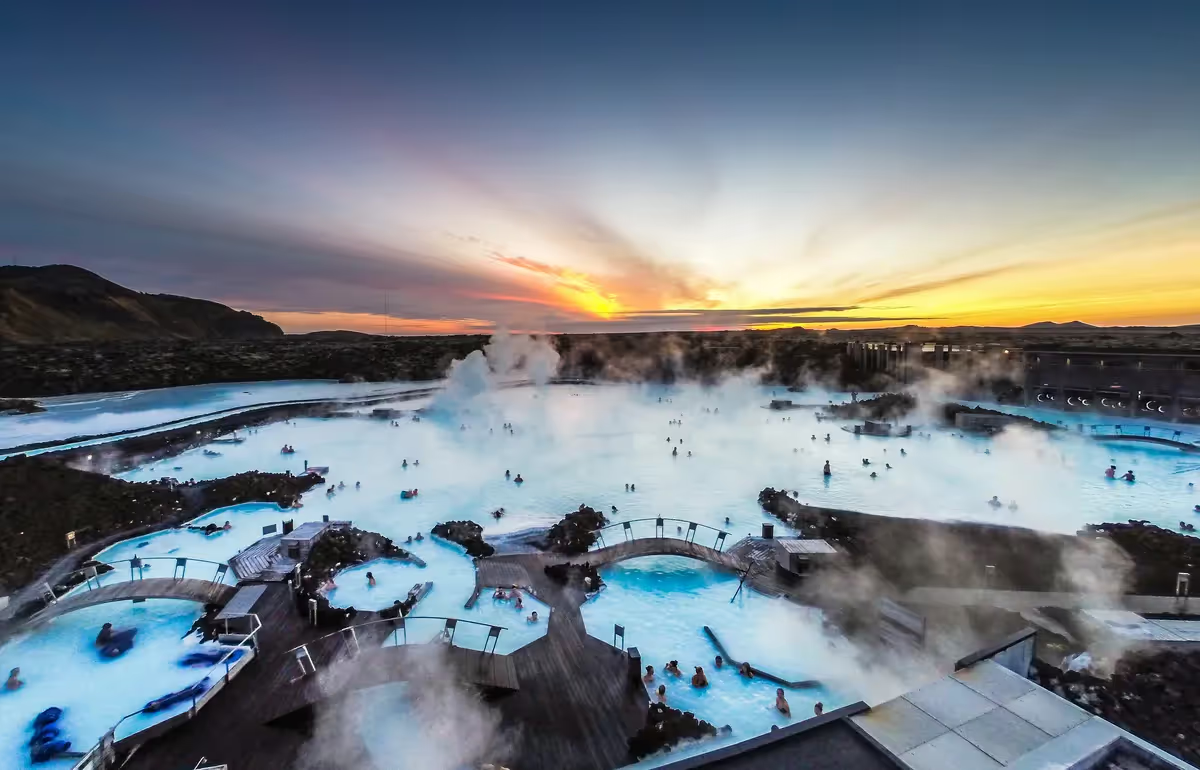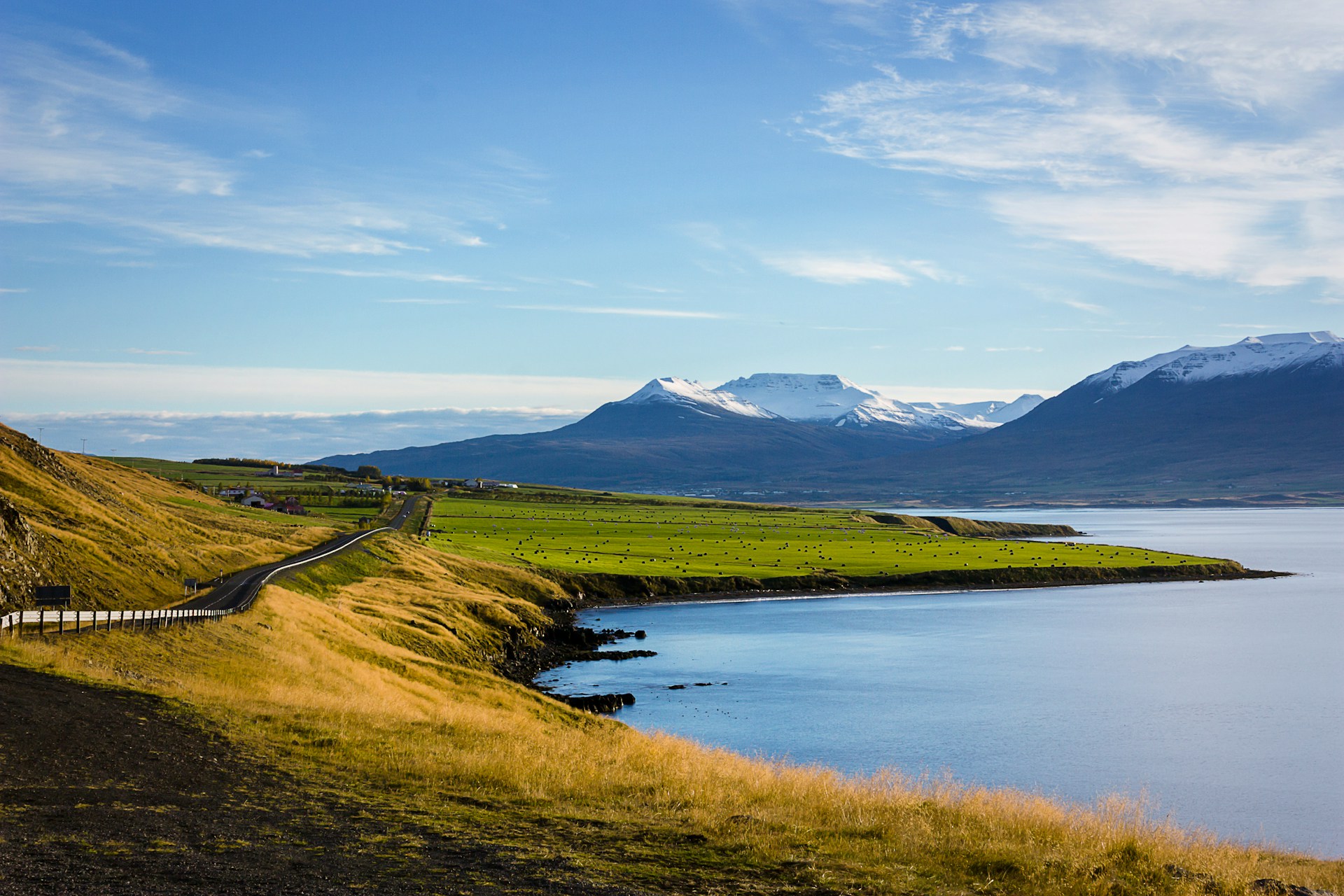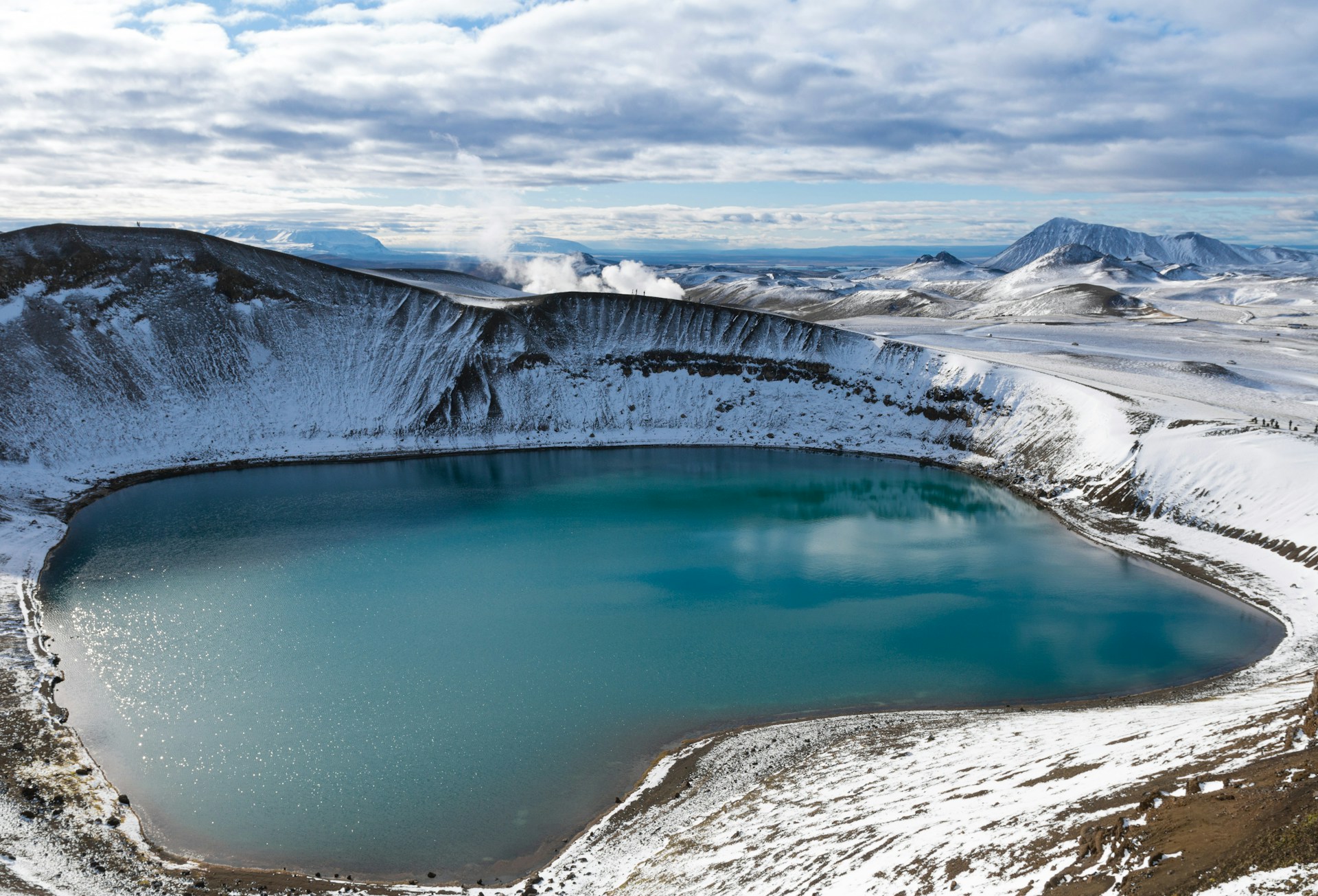Enhance your travel experience by learning essential Icelandic phrases before you go. As the official language, Icelandic is unique among Germanic languages, closely tied to its Norse heritage.
While most Icelandic speakers are fluent in English, using local phrases shows respect and can often lead to more enriching interactions. This guide will introduce you to key Icelandic phrases and pronunciation tips, helping you navigate the language barrier and connect more deeply with Iceland's rich culture and history.
Let's dive into some basic Icelandic phrases to make your journey even more memorable!

Best Golden Circle Tour From Reykjavik: Geysir, Gullfoss and Thingvellir
Experience Iceland's most famous natural wonders with this top-rated tour departing from Reykjavik.
The Origin of the Icelandic Language
The Icelandic language, belonging to the Germanic language family, shares its roots with Old Norse, the language of the Vikings. Remarkably, it has remained relatively unchanged since medieval times.
Under Danish rule until the 20th century, Icelandic preserved its identity and evolved independently of other Scandinavian languages. It makes it both a gateway to ancient literature and a notoriously tricky language for learners.
Pronunciation Guide: Common Icelandic Words and Phrases

Icelandic word can be challenging for English speakers. The Icelandic alphabet has 32 letters, some of which are not found in the English alphabet.
Key phrases in Icelandic hinge on understanding the unique sounds and stresses, often on the first syllable. The letter pronunciation differs significantly from the English alphabet, making pronunciation tips essential for travelers.

Northern Lights Boat Tour
View the spectacular Northern Lights from a boat away from the bright city lights. Observing decks that have been specially created provide the ideal platform for viewing...
'Hello'
Immersing yourself in a new culture begins with mastering the art of greeting. A casual 'Hello' in Icelandic translates to 'Hæ' (pronounced Hay), a light and breezy syllable that fits the friendly Icelandic demeanor.
For a more formal setting, you'd say 'Góðan dag' (pronounced Go-than day), which means 'Good day'.
'Goodbye'
When it's time to part ways, you bid adieu by saying 'Bless'. While it's pronounced and spelled the same as the English word for a divine favor, in Icelandic, it's a common way to say 'Goodbye'.
'Yes'
Even expressing agreement or disagreement can be an adventure in the Land of Fire and Ice. When you want to say 'Yes' in Icelandic, you say 'Já' (pronounced Yow).
Interestingly, 'Já' sounds similar to 'yow', an English slang term used to express excitement or agreement.
'No'
On the other hand, to express 'No', you say 'Nei' (pronounced Nay), which rhymes with the English word 'day'. These primary responses are as essential as your travel map, guiding you through many situations, whether confirming a booking at a cozy guesthouse or answering a new friend's query.

Private Golden Circle Day Tour in Iceland: A Unique Adventure
Have you ever dreamed of exploring Iceland’s breathtaking landscapes in style and comfort? Imagine having the freedom to customize your adventure, visit hidden gems, and immerse yourself in the country’s natural wonders.
'Please'
When it comes to politeness, the Icelandic language has its charm. Interestingly, Icelandic has no direct translation for the word 'Please'. Instead, politeness is often conveyed through the context of the conversation and the tone of voice.
However, if you want to request something politely, you can add 'gætið þú' (pronounced gay-tee-thu) before your request, which translates to 'Could you'.
'Thank You'

For expressing gratitude, the phrase is 'Takk' (pronounced T-ah-k), which means 'Thank You'. The beautiful thing about this phrase is its simplicity and how genuinely it's usually received.
'You're Welcome'
To respond to thanks, you say 'Þú ert velkomin' (pronounced Thoo ert vel-koh-min), which means 'You're Welcome'. Using these phrases is a surefire way to leave a positive impression on the locals, reinforcing the friendly connection you've already established with your perfect greetings.
'Excuse Me'
Navigating crowded places or catching someone's attention gracefully requires the correct usage of 'Excuse Me'. In Icelandic, 'Excuse Me' translates to 'Afsakið' (pronounced Av-sa-keeth).
It's a handy phrase to have in your toolkit, especially in bustling Icelandic settings like the famous weekend Kolaportið Flea Market or when navigating through a crowd at one of the many music festivals.
'Do You Speak English?'
Even though many Icelanders are proficient in English, knowing how to ask this question in Icelandic can show respect for the local language and culture. The phrase is 'Talar þú ensku?' (pronounced Ta-lar thu en-sku), Which directly translates to 'Do you speak English?'.

Golden Circle Iceland and Secret Lagoon Tour from Reykjavik
Golden Circle & Secret Lagoon Island provides an excellent day trip with some of nature’s most wondrous sights, from bubbling geysers and thundering waterfalls to geological marvels draped in thousands of years of history.
'I Don't Understand'
Despite your best efforts to learn some Icelandic, there may be times when you need guidance in a conversation. Knowing how to say 'I don't understand' can be a lifesaver.
The phrase is 'Ég skil ekki' (pronounced Yeg skeel eh-kee). Expressing confusion honestly instead of pretending to understand is appreciated in Icelandic culture.
'Where Is…?'

Iceland is an explorer's dream come true, with its majestic landscapes and natural wonders across the island. But to navigate this Nordic paradise effectively, knowing how to ask for directions in Icelandic can be incredibly handy.
'Where is...' translates to 'Hvar er...' (pronounced Kvar er). Whether you're looking for 'Hvar er hotelið mitt?' (Where is my hotel?) or 'Hvar er næsta veitingahús?' (Where is the nearest restaurant?), this phrase will help you navigate your way through the enchanting Icelandic terrains.
'Bathroom'
Let's talk practicality. No matter where you are, knowing how to ask for the restroom is a must.
In Icelandic, 'bathroom' or 'restroom' is 'klósett' (pronounced kloh-set). In a restaurant or café, you could say, 'Hvar er klósettið?' (Where is the bathroom?).
'Help!'
Iceland is an incredibly safe country. However, like any other destination, knowing the local word for 'Help!' is crucial in emergencies.
'Help' translates to 'Hjálp' (pronounced Hyowlp) in Icelandic. Although we hope you'll never need to use it, this phrase can be vital if you are in a predicament.
'Cheers!'
Partaking in the local toasting tradition is a fun way to immerse yourself in Icelandic culture. When raising a glass, Icelanders say 'Skál' (pronounced Sk-owl), which means 'Cheers'.
'Beautiful'
With its breathtaking landscapes and stunning natural phenomena, you'll find plenty of reasons to use the word 'Fagurt' (pronounced Fag-urt), which means 'Beautiful' in Icelandic. Whether you're admiring the surreal beauty of the Northern Lights, the stunning architecture of Hallgrimskirkja church, or the charisma of an Icelandic horse, expressing your awe in the local language will add another layer of depth to your appreciation.
After all, what's more beautiful than articulating your admiration in the same language that named and nurtured these wonders for centuries?

The Classic Icelandic Northern Lights Bus Tour
The classic Icelandic Northern Lights bus tour offers an enchanting journey away from Reykjavik's city lights to seek out the spectacular aurora borealis in Iceland's dark countryside.
'How Much?'
Exploring Icelandic cuisine is an adventure in itself. Knowing how to ask 'How much?' or compliment the chef will enhance your dining experience. 'How much?' translates to 'Hvað kostar það?' (pronounced Kvath kostar thadh), an essential phrase for any shopping or dining situation.
'Delicious'

After enjoying a delightful meal, compliment the chef by saying 'Þetta er ljúffengt' (pronounced Thetta er lyoo-fengt), which means 'This is delicious'. Trust us, your appreciation will not go unnoticed!
'Good Night'
As your day winds down, or you're parting ways with your new Icelandic friends, knowing how to say 'Good Night' and 'See You Later' in Icelandic will be the cherry on your linguistic journey. 'Good Night' translates to 'Góða nótt' (pronounced Go-tha nott), a phrase that carries the tranquility of the Icelandic nights within its syllables.
'See You Later'
To say 'See You Later', you'd say 'Sjáumst' (pronounced Shy-owmst), a more casual and friendly phrase that implies a hopeful expectation of meeting again. What better way to end your day or bid goodbye than with these heartwarming Icelandic phrases?
Pronunciation Tips and Advice

Improving your pronunciation of Icelandic can significantly enhance your communication and experience while visiting Iceland. Here are some valuable tips to help you get the pronunciation right:
- Listen and Imitate: One of the best ways to learn correct pronunciation is by listening to native Icelandic speakers. Use online resources, language apps, or Icelandic radio and TV shows to immerse yourself in the language.
- Learn the Sounds of the Icelandic Alphabet: Familiarize yourself with the Icelandic alphabet, especially the letters that don't exist in English, like 'þ' (thorn) and 'ð' (eth). Each letter has a unique sound, which is key to proper pronunciation.
- Stress the First Syllable: In Icelandic, the stress is almost always on the first syllable of a word. Keeping this in mind can instantly improve how you sound.
- Practice Vowel Sounds: Icelandic vowel sounds can be quite different from English. Pay special attention to vowels like 'æ', pronounced like the 'i' in 'bite', and 'ö', somewhat similar to the 'i' in 'bird'.
- Roll Your Rs: The Icelandic 'r' is rolled, a feature that might take some practice for English speakers. Try practicing with words like 'rúll', which means 'roll'.
Remember, mastering Icelandic pronunciation takes time and practice, so be patient with yourself and keep practicing regularly.
.jpg)
Self Drive Golden Circle Day Tour from Reykjavik in a Tesla
The Golden Circle Tour is a classic tour to experience in Iceland. This tour takes you to some of the country's most iconic and incredible locations, all at your own pace. Explore the scenic route at your own pace, reveling in Iceland's natural beauty. Cruise in a cutting-edge, eco-friendly 4x4 Tesla Model Y.
Final Thoughts
While Icelandic is a Germanic language known for its complexity, learning Icelandic phrases for travelers can enrich your journey. Even a few key phrases or words in Icelandic can open doors to more profound cultural immersion.
As you explore Iceland, let your newfound phrases be a bridge to understanding this beautiful and unique language. Learn more at Golden Circle Tours now.
FAQs
Can I get by in Iceland without knowing Icelandic?
Most Icelanders speak English fluently, particularly those working in tourism and larger cities. However, knowing some basic Icelandic phrases can enhance your travel experience and help you connect with the local culture.
Are there language-learning apps that can help me learn Icelandic phrases?
Yes, various language-learning apps and online resources can help you learn Icelandic. These platforms usually offer pronunciation guides, making them excellent tools for learning and practising phrases.
What other languages do Icelanders speak?
Icelanders are generally multilingual, and most speak English fluently. Other languages Icelandic spoken in include:
Danish, German, Spanish, French, Polish, Lithuanian, Portuguese, Filipino, Thai, Latvian.


